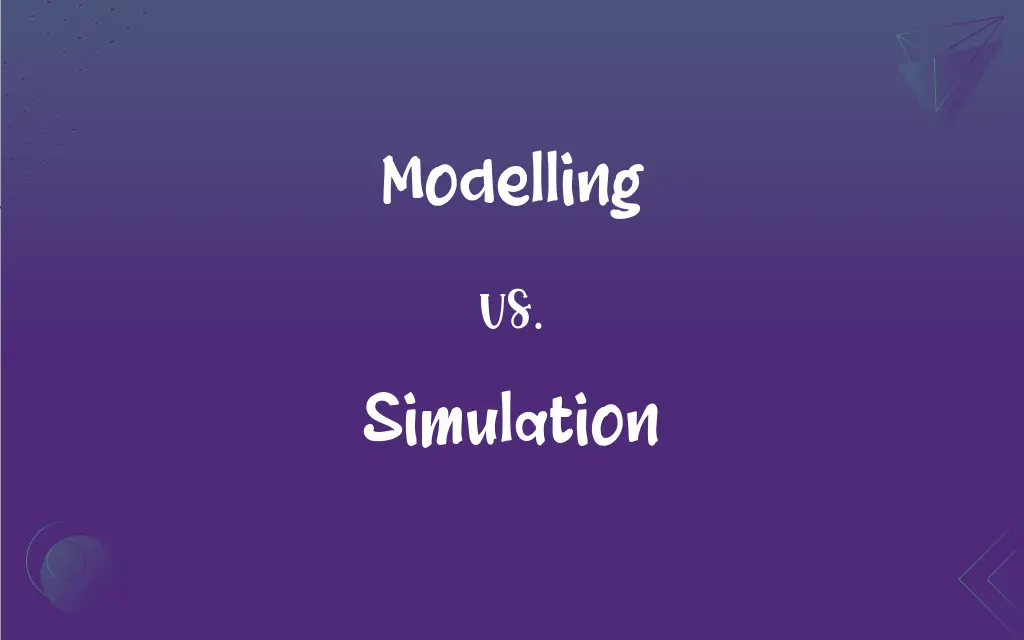Modelling vs. Simulation: What's the Difference?
Edited by Harlon Moss || By Janet White || Published on December 25, 2023
Modelling is creating a representation of a system or process, while simulation involves using a model to replicate and study behavior under various conditions.

Key Differences
Modelling involves creating abstract representations of systems, capturing essential features to study them, while simulation uses these models to run experiments and predict outcomes.
The key objective of modelling is to simplify and distill complex systems into manageable representations, whereas simulation aims to utilize these models to understand how systems behave over time.
Modelling is the foundational step in analysis, focusing on the design of the model itself. In contrast, simulation is the application phase, where the model is put into action to test scenarios.
Models can be static, capturing a system at a single point in time, or dynamic for evolving systems. Simulations, however, are inherently dynamic, mimicking the real-time progression of modeled systems.
Modelling often involves mathematical or conceptual frameworks, whereas simulations typically require computational tools to mimic real-world processes based on these models.
ADVERTISEMENT
Comparison Chart
Purpose
To create a representation of a system.
To use the model to replicate system behavior.
Focus
On the structure and components of the system.
On the dynamic process and interaction within the system.
Tools Used
Mathematical formulas, diagrams, conceptual models.
Computer software, algorithms, virtual environments.
Output
A model that describes or predicts aspects of reality.
An experimental setup to test predictions and scenarios.
Application
Used in initial stages of analysis and design.
Used for testing, experimentation, and prediction.
ADVERTISEMENT
Modelling and Simulation Definitions
Modelling
Modelling is the process of creating a representation of a real-world system.
Architectural modelling involves creating scaled-down versions of buildings for design analysis.
Simulation
It helps in studying how systems behave under different scenarios.
Traffic simulation assesses the impact of new road layouts.
Modelling
It involves abstracting key features of a system for analysis.
Economic modelling simplifies markets to understand financial trends.
Simulation
Simulation is used for training and education.
Medical simulation allows surgeons to practice procedures virtually.
Modelling
It is often used to test hypotheses in a controlled manner.
Biological modelling tests the impact of drugs on diseases.
Simulation
Simulation is the process of using a model to replicate real-world processes.
Flight simulation trains pilots under various flying conditions.
Modelling
Modelling serves as a tool for understanding complex phenomena.
Astrophysical modelling helps scientists understand celestial mechanics.
Simulation
It enables the testing of models in a virtual environment.
Software simulation tests new computer programs in a controlled setting.
Modelling
Modelling can be used to predict future outcomes.
Weather modelling predicts future climate patterns.
Simulation
Simulation can be used for entertainment and gaming.
Racing games use simulation for a realistic driving experience.
Modelling
A small object, usually built to scale, that represents in detail another, often larger object.
Modelling
A preliminary work or construction that serves as a plan from which a final product is to be made
A clay model ready for casting.
FAQs
What is the role of simulation in engineering?
In engineering, simulation plays a critical role in testing designs and systems before actual implementation.
What is modelling in simple terms?
Modelling is creating a simplified representation of a complex system or process.
What does simulation mean?
Simulation means using a model to replicate and study the behavior of a system under various conditions.
Are computer models a form of modelling?
Yes, computer models are a common form of modelling, especially in computational fields.
How is modelling used in science?
In science, modelling is used to understand, explain, and predict natural phenomena.
Can simulations replace real-world testing?
Simulations can complement but not always replace real-world testing, as they rely on the accuracy of models.
Is simulation always computer-based?
While often computer-based, simulations can also be physical or conceptual, depending on the context.
What industries use modelling and simulation?
Industries like aerospace, automotive, healthcare, and finance extensively use modelling and simulation.
Can modelling help in crisis management?
Yes, modelling can predict the impact of crises, aiding in planning and response strategies.
How do models and simulations help in decision-making?
They provide a way to test scenarios and predict outcomes, aiding in informed decision-making.
What is the difference between a static and dynamic model?
A static model represents a system at a single point in time, while a dynamic model represents it over time.
What is the significance of real-time simulation?
Real-time simulation is significant for applications requiring immediate feedback, like flight training.
How do models and simulations aid in research and development?
They allow for cost-effective testing of hypotheses and design concepts in R&D processes.
What skills are required for effective modelling?
Effective modelling requires analytical skills, domain knowledge, and often mathematical proficiency.
Can modelling and simulation be wrong?
Yes, if based on incorrect assumptions or data, models and simulations can yield inaccurate results.
How has simulation technology evolved?
Simulation technology has evolved with advances in computing power, allowing more complex and realistic simulations.
Can simulation be used for medical training?
Yes, medical simulations are key for training healthcare professionals in a risk-free environment.
Are there ethical considerations in modelling and simulation?
Yes, especially in simulations involving human behavior, ethical considerations are important.
Are video games a type of simulation?
Many video games use simulation techniques to create realistic or imaginative environments.
How accurate are weather simulations?
Weather simulations are increasingly accurate but still subject to uncertainties and variable factors.
About Author
Written by
Janet WhiteJanet White has been an esteemed writer and blogger for Difference Wiki. Holding a Master's degree in Science and Medical Journalism from the prestigious Boston University, she has consistently demonstrated her expertise and passion for her field. When she's not immersed in her work, Janet relishes her time exercising, delving into a good book, and cherishing moments with friends and family.
Edited by
Harlon MossHarlon is a seasoned quality moderator and accomplished content writer for Difference Wiki. An alumnus of the prestigious University of California, he earned his degree in Computer Science. Leveraging his academic background, Harlon brings a meticulous and informed perspective to his work, ensuring content accuracy and excellence.






































































